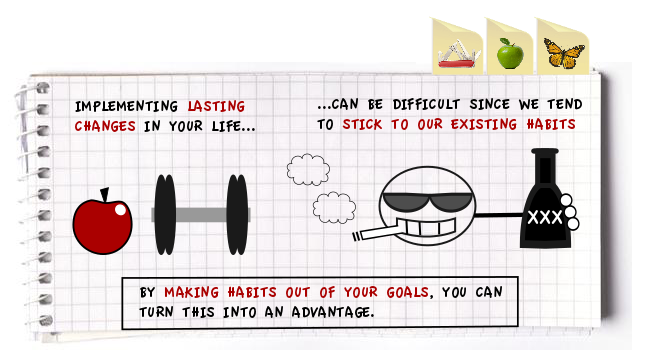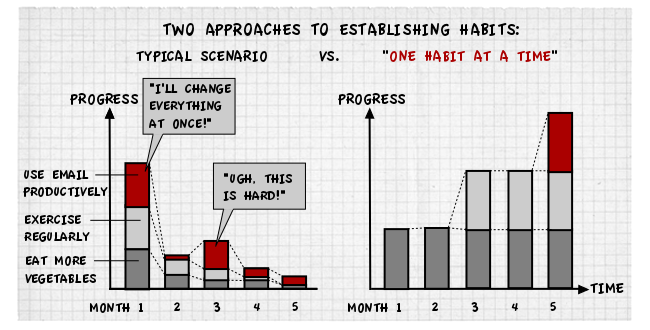Warning: file_get_contents(): php_network_getaddresses: getaddrinfo failed: Name or service not known in /www/htdocs/w00e5436/Handbook/wp-content/plugins/digg-digg/include/dd-class.php on line 1202
Warning: file_get_contents(http://feeds.delicious.com/v2/json/urlinfo/data?url=http%3A%2F%2Fhandbookofawesome.com%2F2011%2F10%2Fhabits%2F): failed to open stream: php_network_getaddresses: getaddrinfo failed: Name or service not known in /www/htdocs/w00e5436/Handbook/wp-content/plugins/digg-digg/include/dd-class.php on line 1202
“Motivation is what gets you started. Habit is what keeps you going.” (Jim Ryun, Olympic athlete)

Everyone has ambitions about how they would like to change their lives: stopping smoking, exercising more, eating healthier, waking up earlier, drinking less, spend ingmore time with their kids, etc. Sometimes the ambition might only last a fleeting moment, like starting to jog every morning can sound like a great idea after a quart of tequila, but seems more like a sick, twisted joke the next day. Mostly you might be spurred on for a few inspired days, but give up your “new and improved” life soon after. Very rarely, however, you might actually create an enduring change in your life. So what separates the successful changes from the epic failures? Ninety-nine-point-nine percent of the time it’s whether you’ve succeeded in forming a habit out of it.
A habit becomes a de facto hard-to-ditch part of your life.
This is all fine and well, but how then do you turn something into a habit? Obviously it’s not impossible, since you for example (hopefully) brush your teeth every morning. This is easy, right? Nevertheless, if you have ever tried to pick up even a modest, non-time consuming habit, you will know it is damn hard to make it last. Usually, you over-exert yourself in the beginning when you’re still motivated, and then start flaking and making excuses, eventually giving up. This sort of failure can rapidly affect your self-confidence, and thus become self-perpetuating. Thankfully, there are tools for maximizing your chances of success, described in the likes of “Power of Less” by Leo Babuta.
The basic idea behind habit-forming is that if you manage to do something for thirty days, chances are you can keep doing it for the rest of your life. (Think of heroine, for example.) It is way easier to stay motivated for thirty days than for the rest of your life, so it gives you a very attainable goal to strive toward. This method is known as the 30-day challenge.
Five simple steps to get you started:
- Decide on one and only one habit that you wish to acquire in the next month. This limitation is important. A typical self-development enthusiast will have spurts of “I’m gonna fix everything in my life starting today!”, then try to implement about 20 new habits and give up on all of them after just a few days. Being greedy at this stage will land you back in square one. Feel free, however, to pick a habit you feel will have the greatest impact on your life.
- Write down a plan for what your daily goals will be for the next 30 days, and make sure they are measurable, e.g. “Exercise for 15 minutes” or “Wake up at 6 am”. Start out with small, defining goals you feel are almost too easy, as this will keep you from getting discouraged when your motivation unavoidably ebbs. Also, define a trigger event that will be your cue to start your habit each day. For example, you might decide that every time you brush your teeth, you will immediately follow this with 8 minutes of meditation. Tying the new activity to an old one will reinforce the new habit in your mind and help you remember to do it daily.
- Go public! Tell your friends, family, co-workers, etc. that you are working on this new habit. Choose a few of them to report to daily on your progress. This form of public exposure gives you an extra incentive not to slack off, lest you seem like a undisciplined sack of shit in front of people you know. Turn peer pressure into your greatest ally.
- Keep your chin up. Some setbacks are inevitable. Hell, you’ve been brushing your teeth since you were a kid, but still you might pass out drunk without remembering to brush them (or is that just us?). It doesn’t mean you’ve lost the habit, so give yourself a break if you miss a day. Every little bit you manage is still a huge improvement over the previous month.
- After 30 days, pat yourself on the back for acquiring your new habit! Treat yourself to a meal or something nice, don’t be one of those assholes who neglects to reward themselves for a job well done! If you can’t think of which habit to pick up next, please check our posts for more great ideas!










